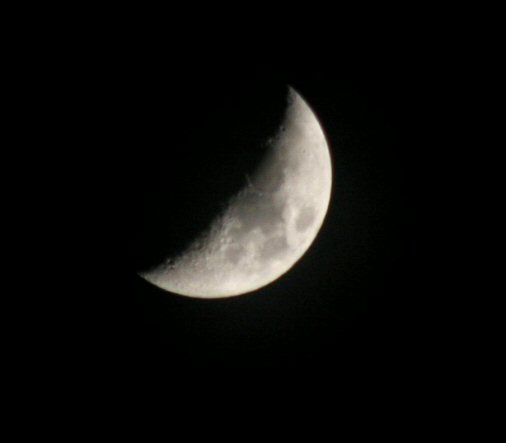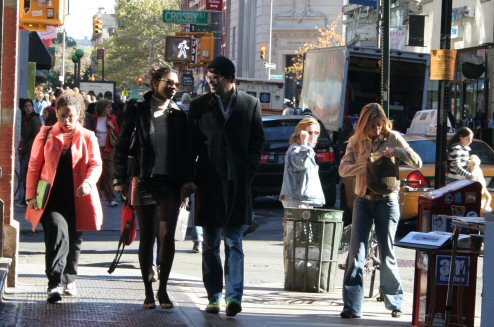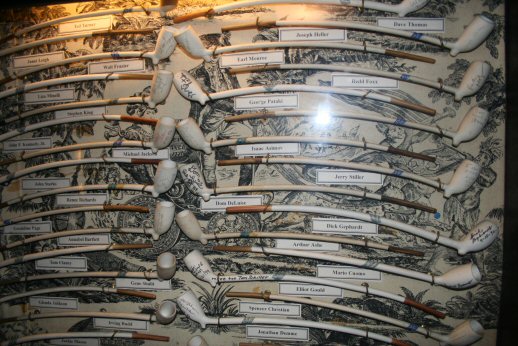tiz a nuff to thank thay wuz a christmus tree in the manjer whar jesus wuz born! whut makes thisn so strange is how usin a tree fer worship wuz cundemned by the earliest non-nativ amurkins:
It is not surprising that, like many other festive Christmas customs, the tree was adopted so late in America. To the New England Puritans, Christmas was sacred. The Pilgrims’ second governor, William Bradford, wrote that he tried hard to stamp out "pagan mockery" of the observance, penalizing any frivolity. The influential Oliver Cromwell preached against "the heathen traditions" of Christmas carols, decorated trees and any joyful expression that desecrated "that sacred event."but whar did that tree cum frum?:
In 1659, the General Court of Massachusetts enacted a law making any observance of December 25 (other than a church service) a penal offense; people were fined for hanging decorations.
Nature - The recognition of the divine in nature is at the heart of Pagan belief. Pagans are deeply aware of the natural world and see the power of the divine in the ongoing cycle of life and death. Most Pagans are eco-friendly, seeking to live in a way that minimises harm to the natural environment.twuz a nuff to rile sum early christchuns, that feller name of elgius fer instunts:
Concepts of the divine - Pagans worship the divine in many different forms, through feminine as well as masculine imagery and also as without gender. The most important and widely recognised of these are the God and Goddess (or pantheons of God and Goddesses) whose annual cycle of procreation, giving birth and dying defines the Pagan year. Paganism strongly emphasises equality of the sexes. Women play a prominent role in the modern Pagan movement, and Goddess worship features in most Pagan ceremonies.
Pagan theology - Paganism is not based on doctrine or liturgy. Many pagans believe that 'if it harms none, do what you will'. Following this code, Pagan theology is based primarily on experience, with the aim of Pagan ritual being to make contact with the divine in the world that surrounds them.
Diabolical games and dancing or chants of the gentiles will be forbidden. No Christian will do them because he thus makes himself pagan. Nor is it right that diabolical canticles should proceed from a Christian mouth where the sacrament of Christ is placed, which it becomes always to praise God. Therefore, brothers, spurn all inventions of the enemy with all your heart and flee these sacrileges with all horror. Venerate no creature beyond God and his saints. Shun springs and arbors which they call sacred. You are forbidden to make the crook which they place on the crossroads and wherever you find one you should burn it with fire. For you must believe that you can be saved by no other art than the invocation and cross of Christ. For how will it be if groves where these miserable men make their devotions, are felled and the wood from them given to the furnace? See how foolish man is, to offer honor to insensible, dead trees and despise the precepts of God almighty.lucky a nuff, we gut sum good christchuns that dont foller that elgius feller:
WASHINGTON -- If it's a spruce tree adorned with 10,000 lights and 5,000 ornaments displayed on the Capitol grounds in December, it's a Christmas tree and that's what it should be called, says House Speaker Dennis Hastert.we kin all hope the revivull of christmus adorayshun of anshunt pagan tradishuns kin keep rite on – knock on wood!
Hastert, R-Ill., in a letter to the Architect of the Capitol, recommended that the annual Capitol Holiday Tree, as it has been called the past several years, be renamed the Capitol Christmas Tree.
"I strongly urge that we return to this tradition and join the White House, countless other public institutions and millions of American families in celebrating the holiday season with a Christmas tree," Hastert wrote to Architect Alan Hantman.
-1280pxw.gif)















